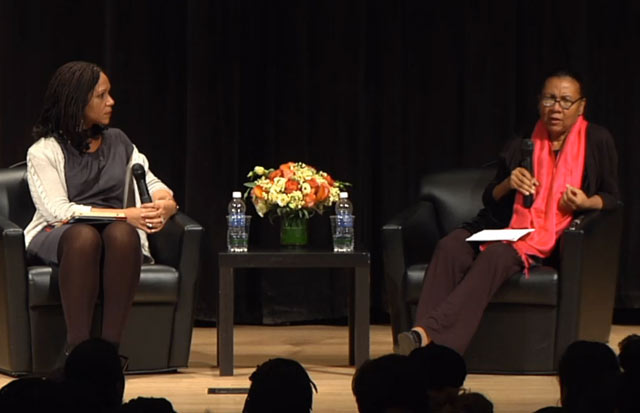On an afternoon last November bell hooks sat on stage in an auditorium at the New School in New York City with Melissa Harris-Perry to talk about the finer points of black feminism. The two had a lively discussion that touched on everything from the trope of the angry black woman to the myth that black people are comfortable living in poverty. But the most seminal moment of the day came during the Q&A portion, when Tanya Fields, a single black mother of four who lives in the Bronx, put words to the painful stigma surrounding single black motherhood.
"The push-back that I am often feeling is not from white folks in the community," said Fields. It is from the other sisters who tear me down, tell me that the reason I am low-income is because I didn’t have the insight to choose good men, that I should’ve kept my hand out and mouth closed and legs closed."
As she took a breath and gathered her emotions, Fields finished with an admission. "I consider myself a black feminist," she said, "but some days, it’s just so hard to get out of bed and face other black people."
Harris-Perry then got up, walked off stage toward Fields, and embraced her in a long, tearful hug.
It was the night’s most powerful moment. For all of the bile thrown at single black mothers, this had turned into a moment to truly celebrate them. But it wasn’t just the audience of roughly 900 people inside of the New School auditorium that witnessed it. Hundreds more were tuned into a livestream of the talk.
Technology is changing the shape of education. Aspiring students can earn online degrees at schools such as the University of Phoenix or sign up with Coursera to take free online classes from Harvard, Stanford and MIT. Even elementary school classrooms are equipped with iPads. And while education’s drift toward tech is fraught with questions of legitimacy, depth and professors’ job security, what has emerged over the past six months is an opening for public intellectuals of color to work with universities and libraries to bring their work to broader audiences.
Stephanie Browner, a dean and professor of Literary Studies at the New School, says that the talk’s popularity was the result of a perfect storm. "What good, race-thinking feminist doesn’t read bell hooks?" Browner asks. "But we don’t have a lot of opportunities to see bell hooks. She’s a great thinker who walks between the academy and connecting [concepts] with regular peoples’ lives. You add Melissa Harris-Perry and the platform she has on MSNBC, put them up on stage and record it, and there’s an incredible appetite for that."
The trend didn’t start or stop with bell hooks and Melissa Harris Perry at the New School. The concept of live-streaming is an old one in Internet years, and the New School’s YouTube page is filled with hundreds of recorded lectures, panels, and conversations, part of the school’s institutional commitment bridging the gap between academia and the broader world. But the hooks and Perry talk marked the beginning of a boomlet.
In December, Junot Diaz interviewed Toni Morrison in a discussion that was live-streamed by the New York Public Library. Ken Weine, the New York Public Library’s vice president for communications and marketing, says the livestreaming is just one part of their approach to engaging the public.
"The New York Public Library is always looking for new and better ways to make our resources accessible to as many people as possible, and that’s certainly true with live events," says Weine. "We’re very interested in finding ways to make our public programs available to people who aren’t able to join us in person, which is why we first started experimenting with live-streaming and we’re definitely seeing a demand for recordings that people can share and revisit in the days, weeks, and even years after an event, and we’re responding to that as well."
In just the first four months of 2014, online viewers have watched bestselling authors Zadie Smith with Chimimanda Ngozi Adichie at Harlem’s Schomberg for Research in Black Culture, and professor Robin D.G. Kelley at Emerson College’s Center for Theater Commons.
"[Video] allows a peer review process of the masses," says Browner, referring to the academic process by which work is judged by one’s colleagues.
The form is a draw to viewers who, because of time, distance or access, may not be able to witness them in person. To date, the bell hooks and Melissa Harris-Perry talk has been viewed more than 255,000 times on Livestream’s website since it first streamed five months ago, and that’s not counting the additional hundreds of thousands of views on MSNBC’s website and YouTube.
Zadie Smith and Chimimanda Ngozi Adichie’s has been viewed more than 84,000 times in leas than a month. These are big names that would draw audiences wherever they spoke, but the shelf life and reach of those speeches is now much larger than before, according to those who have planned the events.
For hooks, who’s the author of more than two dozen books on race and feminism, the talk proved that the public is hungry for meaningful, prolonged opportunities to engage with one another. "I believe that conversation is the most powerful tool of learning and communicating in our culture right now," hooks said in a statement provided to Colorlines.
